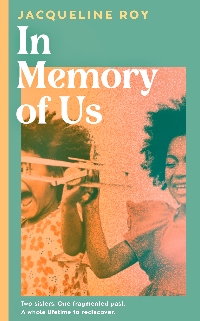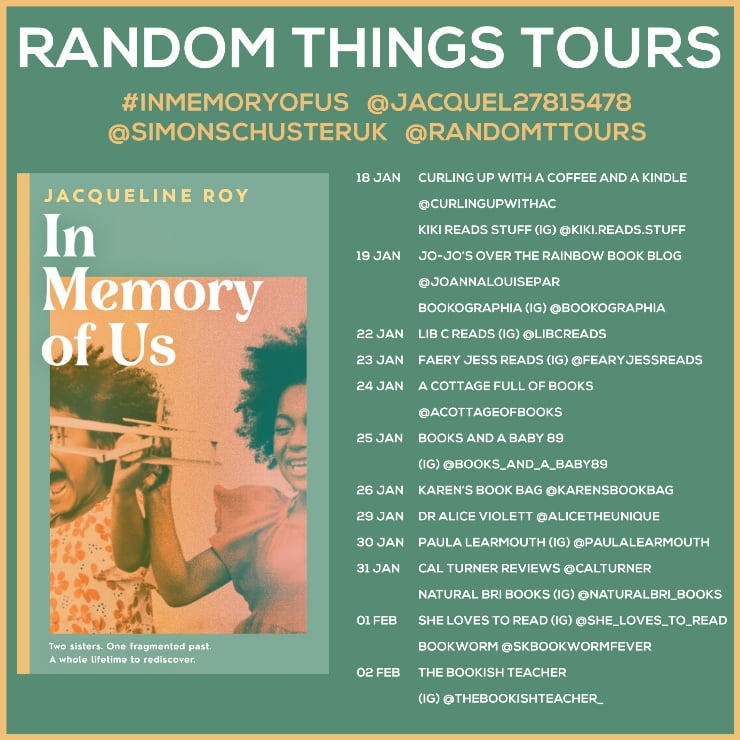Blog tour: In Memory of Us by Jacqueline Roy

This post is part of a blog tour organised by Random Things Blog Tours. I received a free copy of the book in return for an honest review.
‘What does it mean to remember?
‘Joined at birth, then pulled apart, Selina and Zora’s relationship is marked by a pattern of closeness and separation.
‘Growing up in 50s’ and 60s’ London under the shadow of Enoch Powell, they are instinctively dependent on each other, and yet Zora yearns for her own identity. But in the eyes of the people around them, the twins are interchangeable.
‘They come as a pair.
‘They are Selzora.
‘Now in her seventies and living with the early stages of dementia, Selina is tracing shards of memory. She is intent on untangling the traumatic events of the past that changed the twins’ lives.
‘Perhaps Lydia, who has reintroduced herself to Selina with sharp, cool charisma, will help her find answers. But even as Selina struggles to make sense of her memories, it’s all too clear that Lydia is hiding something.
‘In Memory of Us is a profound evocation of memory, and the strategies employed for illusion and survival in the wake of racism. It offers an often-overlooked insight into life as a Black Briton after the Windrush generation.’

In Memory of Us, by Jacqueline Roy, alternates between the present day, in which septuagenarian Selina is trying to piece together her memories in the face of advancing dementia, and scenes from her past, many of which involve her identical twin sister Zora, their older brother Cal, and their childhood friend, Lydia.
Born to an English mother and a Jamaican father in London in the 1950s, Selina and Zora stand out due to the colour of their skin, in addition to their twinhood.
As young children, the pair find comfort and sanctuary in one another. However, as they grow older, Zora, as the more outgoing and adventurous twin, starts to crave individuality and independence from timid, clingy Selina.
Privileged, scheming Lydia takes advantage of the emerging fissures between them – and ultimately changes the course of their lives. But can Selina, back in contact with Lydia after a gap of many years, remember how?
I found so much to love in In Memory of Us. Right from the start, I was captivated by the twins’ characters and relationship and, of course, the mystery of Selina’s out-of-reach memories and the promise (very much fulfilled!) of breath-taking revelations.
I’ve been drawn to novels about second-generation immigrants growing up in England after WWII since I took a “postcolonial” module as part of my English Literature A Level (think White Teeth and The Buddha of Suburbia), so this book’s setting and themes such as race and class were right up my street.
While racism is a nasty constant for its main characters, In Memory of Us is far from being a heavy read. Roy takes care to highlight the joys as well as the pain in the twins’ lives, and her sparkling prose, wry humour, and vivid descriptions had me flying through the pages.
This is all the more impressive when you consider how the narrative frequently jumps back and forth in time (with some especially skilful links between consecutive sections), and the deliberate inconsistencies in Selina and Zora’s recollections of the same scenes that, at first, make you go “hold on a minute…” and flick back a few pages.
This brings me to my absolute favourite thing about In Memory of Us: the way the author explores various types of memory (dis)function while telling a coherent and gripping story. Selina’s dementia, which causes her to forget words, people, and where she is place- and time-wise, is the most obvious example.
The novel also encompasses false memories (where we “remember” an event we’ve been told we were part of); imperfect recall (where our imagination fills in the gaps in a remembered scene); the suppressive effects of trauma on memory; and the stories we tell ourselves about the past – whether we’re trying to absolve or blame ourselves. These are all things I find fascinating.
Not unrelatedly, I’d say that Selina is underestimated – by herself and others – throughout the book, due to her negative self-perception and the inevitable comparisons with Zora. To me, she comes across as resourceful, tenacious, and more capable of making her voice heard than she thinks.
In Memory of Us is highly engaging and moving, and brilliantly written.
